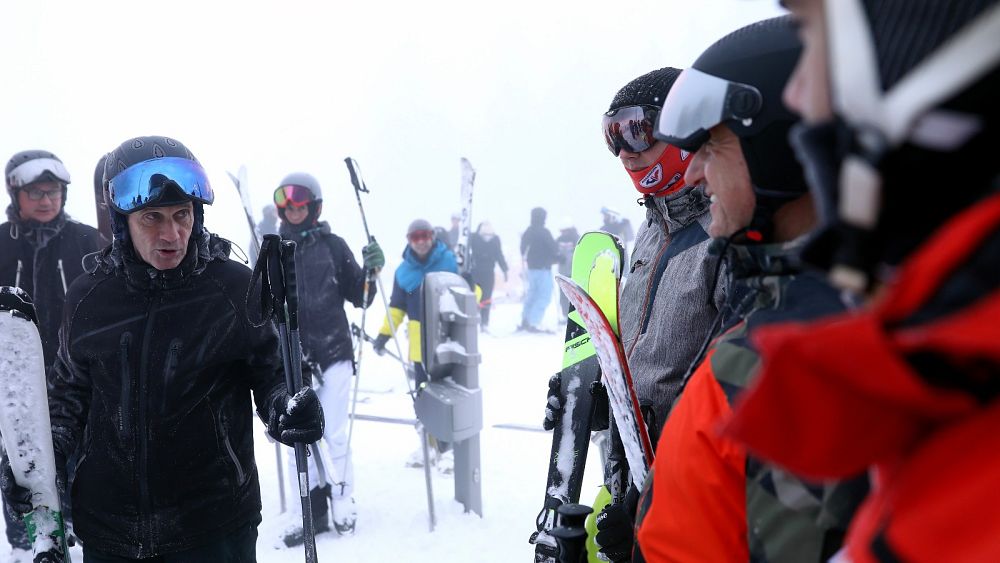
As most European nations impose new restrictions to curb the spread of the omicron variant, Bosnia is taking a relatively laissez-faire approach to soaring COVID-19 infections in the region, much to the delight of its winter tourism industry.
Last week, thousands of skiers from around the country, the Balkans and the European Union happily slalomed their way through fresh snow on Bosnia’s mountain slopes following the official Dec. 4 kickoff for the season. Most ski resorts in the Balkans opened over the past week as well, but with much stricter pandemic-induced capacity and access limits.
On the Jahorina and Bjelasnica mountains near Sarajevo, hosts of the 1984 Winter Olympics, long, tightly packed queues formed at ski lifts while local and international guests gathered at cafes both indoors and outdoors, with some even taking in a nightly music concert.
Travellers coming into Bosnia from the European Union, apart from Croatia, are required to have a negative pre-departure PCR test and proof of recent vaccination or recovery from COVID-19 to enter the country. Citizens of Croatia, Serbia and Montenegro are exempt from that rule.
But once a person is in Bosnia, they are not required to present proof of vaccination, a recent recovery or a recent negative test to access the ski slopes, restaurants, bars or cultural venues. While indoor mask-wearing and social distancing mandates are in place, their enforcement remains haphazard.
“We feel very safe here. Conditions are generally good, despite the pandemic,” said Sejla Ibric, who drove over 160 kilometres to Jahorina with her husband to enjoy the first ski weekend of the season.
The managers of the Jahorina and Bjelasnica ski resorts — which form the backbone of Bosnia’s winter tourism sites — note that some precautions seek to slow the spread of COVID-19, including mandatory mask-wearing and reduced capacity in ski lifts. Additional steps have been taken to accommodate guests’ specific pandemic-related needs.
“We have our own PCR testing laboratory and guests who require a negative test to return to their country can have their samples taken in their rooms,” says Dejan Ljevanic, the general manager of Jahorina. The resort also guarantees refunds to ski-pass holders in case they get infected, he added.
Bosnia — which has fully vaccinated only just over 24% of its 3.3 million people — has been registering about 600 new cases and 30 COVID-19 deaths a day of late. It has seen over 12,900 COVID-19 deaths in the pandemic.
Most countries near Bosnia — all of which have notably higher vaccination rates — are seeing quickly rising daily infections and tighter restrictions on daily life. In the Czech Republic and Slovakia, the two EU members have recently been reporting record new infections a day and Slovakia is in a national lockdown. In Croatia and Slovenia, also EU members, mandatory COVID-19 passes were introduced last month to access most public spaces. In Serbia this fall, graveyard diggers in Belgrade had to work an extra day each week to keep up with COVID-19 deaths.
“Things are going downhill back home with regards to the virus, but here it feels as if it does not exist,” said Mili Planincic of Croatia, who was getting ready to glide down a ski slope in Jahorina.
“People are relaxed, but at the same time they are keeping within reasonable limits” to prevent the spread of the infection, he added.
Others, like Milomir Zele from Serbia, said it was up to visitors to take the necessary precautions.
“One has to be careful, to wear a mask, and get vaccinated beforehand. We did all that,” he said.
Tine Salomon from Slovenia agreed: “If people act responsibly, there should be no problem. We are outdoors and the snow is good, idyllic.”
Last winter, both the Bjelasnica and Jahorina ski resorts registered a record number of visitors, due to Bosnia’s relatively low virus transmission rates compared with the rest of the region and its laid-back approach to anti-virus restrictions. However, Bosnia’s peak ski season was followed last March by a major virus surge and a spike in COVID-19 deaths in the country.
“This year, we expect the ski season to last between 4 and 4 1/2 months. It would be spectacular if we had a repeat of the last season,” said Jasmin Mehic, general manager of the Bjelasnica ski resort.
“We expect that (antivirus) restrictions will not get too harsh, although we will also respect harsher restrictions if (health authorities) decide to introduce them,” he added.